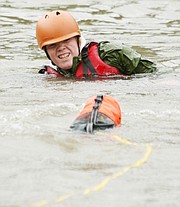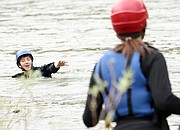Practicing river safety
"Catch the rope, not the bag."
The words echoed across the Clark Fork River on Monday afternoon, but it was not because of the cavernous walls. rather it was because of the eight to ten high school students yelling the words one after another as part of their river safety training.
"Catch the rope, not the bag."
The words echoed across the Clark Fork River on Monday afternoon, but it was not because of the cavernous walls. rather it was because of the eight to ten high school students yelling the words one after another as part of their river safety training.
The high school students, new members of the Camp Bighorn summer staff, were practicing river rescues that they need to know as they'll be taking campers out on the water on either kayaks or rafts.
One by one a student would swim out into the middle of the river and float downstream where another student would wait with a rope bag where they would toss the rope to the swimmer and pull him to the shore.
It was the culmination of an outdoors lesson that started on the lawns of Camp Bighorn ealier that day.
First they started out simply by practicing throwing the bag that had the rope coiled inside over the head of the partner. The permanent staff at the camp made sure that the students focused on every aspect of the seemingly simple task.
This included coiling the rope with a steady hand to avoid tangles, communicating clearly to the swimmer and having them place the rope on the shoulder furthest away from the shore.
Still it was a surprise for students to go down to the river where they practiced the technique in the cold and rain on a Clark Fork river that was rushing at full height.
"It certainly is a lot different throwing [the bag] on water than on the lawn," said a soaking wet Delaney Ziomek, a sophomore from Pearl Harbor, Hawaii.
She just got done acting the part of the swimmer and was thankful for being well-trained on dry ground before she had to jump in the rushing river.
She went onto speculate how different it would be if it was a real life or death situation with all of the adrenaline that she would have to deal with when undergoing the rescue operation.
"I'd have to look back and rely on training," said Ziomek. "Hopefully this training is going to be the only time we have to do this."
Ziomek is one of 54 summer staff members that have descended upon Camp Bighorn in the last couple weeks.
Another student Jake Tyree from Medical Lake, Wash., came to the camp for the first time this year and was looking for more experience in the outdoors.
"[I wanted] to experience something different, learn some outdoor skills away from city," said Tyree. As of Monday Tyree said he has already learned CPR, first aid training, navigating a ropes course and things to know when hiking. His favorite so far was learning first aid and CPR.
"It's joking around here (practicing on the dummies), but in CPR you're actually saving someone's life, reviving someone from the dead."
During the rest of this week, the summer staff will train in several more technical outdoor activities such as rock climbing, kayaking and navigating a ropes course.
Their training will end this week and campers will begin to arrive on Monday.





